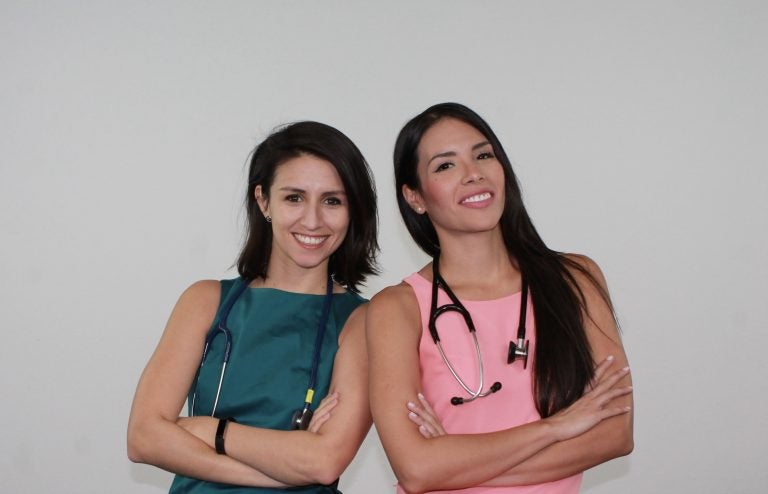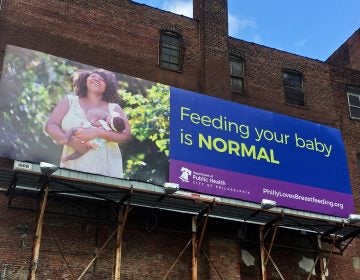Two pediatricians at CHOP launch podcast for Latino parents
'Las Doctoras Recomiendan' — or 'The Doctors Recommend' — sounds like getting advice from a friend.
Listen 2:19
Drs. Angela Castellanos and Edith Bracho Sanchez, both pediatricians, produce and host "Las Doctoras Recomiendan," a Spanish-language health podcast for Latino families. (Photo courtesy of Angela Castellanos)
You probably know the feeling of being rushed at the doctor’s office: You have a million questions, but it always seems like the doctor is in and out of the appointment so fast, there’s no time to ask.
Well, it turns out a lot of doctors wish they had more time, too.
That’s why two pediatricians at the Children’s Hospital of Philadelphia have started a podcast — specifically for the patients they wish they could spend the most time with: Latino families.
Drs. Edith Bracho Sanchez and Angela Castellanos launched the show, called “Las Doctoras Recomiendan” in March with support from the American Academy of Pediatrics. They release weekly episodes in Spanish, with topics ranging from obesity prevention to recognizing abusive relationships and gang violence, to how to talk to your children about discrimination and racism.
Bracho Sanchez, who hosts the podcast and grew up in Venezuela, said she tries to approach issues like disciplining children with a level of cultural sensitivity specific to the Latino community.
“I think we, as Latina pediatricians, are able to tackle that subject by starting from a place of, ‘We grew up being spanked — our family members continue to spank their kids — and yet this is what we know now as pediatricians,’ ” she said.
To address the issue, she interviewed a psychiatrist on the show to explain, without judgment, what research shows about the long-term impact of physical punishment.
Infant nutrition is another issue that the literature may not fully address, Bracho Sanchez said.
“It’s very common in the Latino community to give kids and babies juice,” she said of the patients she sees in South Philadelphia. Her response was to book a nutritionist on the show to speak about the benefits of dental hygiene and avoiding sugar.
The more they talked to their patients, the more the show producers realized that — for a lot of families — staying healthy meant addressing some very real immigration concerns. Many of the families Bracho Sanchez sees are undocumented, and they have a lot of reasonable questions about visiting the doctor’s office.
“Is it worth it to go to the doctor from an immigration standpoint? And then, if you find yourself detained, what do you do?” she said. “What do your children do?”
On a number of occasions, she would recommend that a patient see a specialist. But that patient wouldn’t go because the doctor’s office was in an area of town where Immigration and Customs Enforcement had been especially active.
To respond to these concerns, the podcast hosted an immigration attorney, who walked listeners through the current laws and what to do if detained by ICE.
Audio is a familiar medium for the Latino community. According to Nielsen, Hispanics spend more time listening to the radio than any other ethnic group — and that number is growing. While streaming audio and downloading podcasts are slightly different, the same survey found that audio streaming by smartphone among Hispanics increased by 29 percent in 2016.
The co-creators said they were inspired by the slowly growing audience on Univision’s podcast platform, launched in 2017. They also like using audio because it circumvents any literacy issues, and its tone is more conversational than clinical — making it sound like getting advice from a friend.
To spread the word about the show, Bracho Sanchez and Castellanos are sharing the podcast with pediatricians around the country through the American Academy of Pediatrics and advertising on social media. They recently interviewed some Latina mom bloggers in hopes of tapping into their audiences. They have more than 2,300 listeners in 31 countries.
As their Latino patients leave the office, they hand out cards explaining how to tune in.
Bracho Sanchez said she feels better about leaving a consultation with a family knowing she can direct them to the podcast as a resource.
“I would ask a mom, you know, ‘How are you feeling? How are things in your community? Is there ICE presence, are there any rumors going around?’ And then if the mom said to me, ‘Actually, yes, it’s really stressful, there’s a lot of ICE presence,’ I can do something more than say, ‘I’m so sorry.’ ”
WHYY is your source for fact-based, in-depth journalism and information. As a nonprofit organization, we rely on financial support from readers like you. Please give today.





